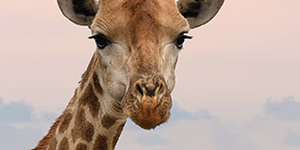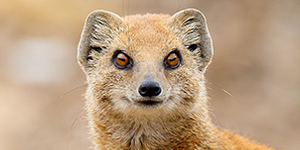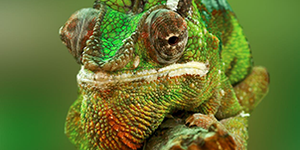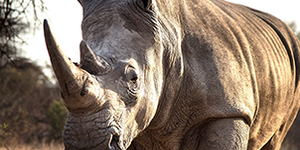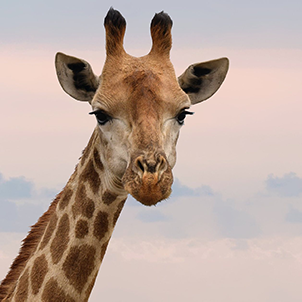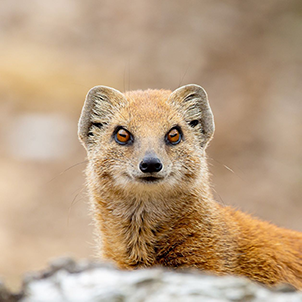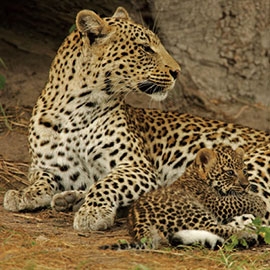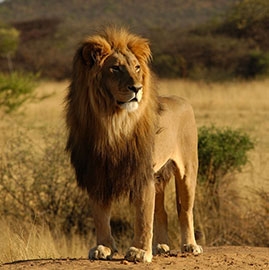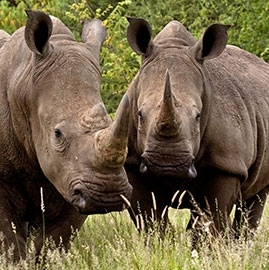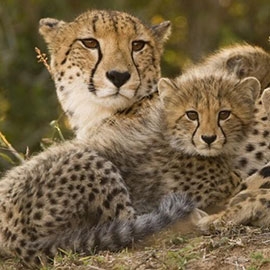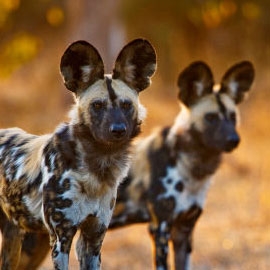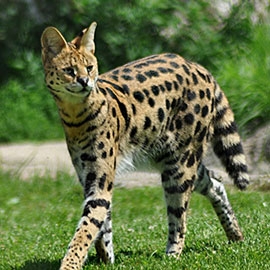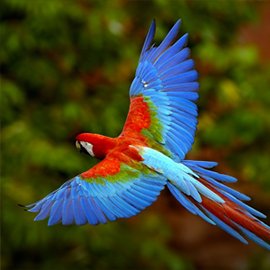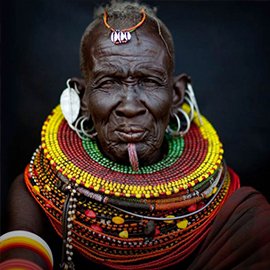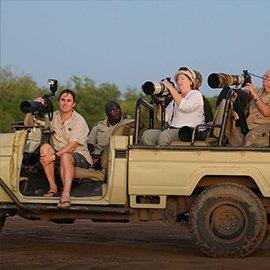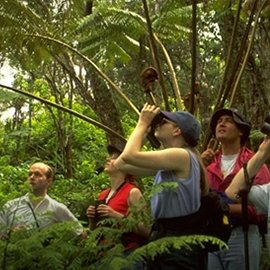Ngorongoro Crater Conservation Area
Safari suitability: 9/10
Find your tourThe park has all of the big five, but its small, limited size means that one or two days will suffice.
What YAS members think
Highlights
- Black-maned lions
- All of the big five
- No giraffe on the crater floor
- UNESCO World Heritage Site
- Proximity to other great parks, such as the Serengeti and Lake Manyara.
About Ngorongoro Crater Conservation Area
Ngorongoro Crater was originally part of the Serengeti National Park, until it became its own park in 1959. In 1979 it was declared a UNESCO World Heritage Site, is one of the most-visited regions of Tanzania and is often referred to as the eighth wonder of the world. The crater is actually the world’s largest intact caldera, with the walls of the crater being roughly 670m (2000ft) high and the crater floor measuring roughly 18km (10 miles) in diameter. The crater floor has its own ecosystem and environment and it is not uncommon for the temperature to be significantly warmer on the crater floor than it is at the rim of the crater. The elevation of the rim is around 2280m (7500ft) and the base is around 1680m (5500ft).
Because the crater floor is small in size, it can also become very crowded with vehicles. The high concentration of safari vehicles on the crater floor means the animals are more accustomed to seeing these vehicles and are less timid when they approach. This may make for better photo opportunities but it also can be a bit of a negative point for those looking for a more authentic safari experience.
There are no lodging options on the crater floor and all guests must overnight on the rim. In general, the standard of accommodation is extremely high, with five-star lodges overlooking the caldera. A Ngorongoro Crater safari is recommended for all levels of safari goers and it is a great addition to a Serengeti safari. It is also close to Tarangire and Lake Manyara National Parks.
Ngorongoro Crater wildlife
Between the crater rim and floor it is possible to see all of the big five at Ngorongoro Crater. The crater is one of the best places to see the endangered black rhino. Giraffes are absent from the crater floor. It is thought that the banks of the caldera are too steep for them to ascend. They can be spotted around the rim. Lions have adapted to the cooler temperatures of the crater by growing thicker, darker manes. Lion mane color can vary within the year, depending on ambient temperature. Mane color is thought to also darken with age. The annual wildebeest migration passes by the crater highlands around the months of December through MarchAt the base of the crater is a large soda lake called Lake Magadi or Lake Makat. It is home to thousands of brightly-colored flamingos and is very popular for photo opps.
When to visit Ngorongoro Crater
Ngorongoro Crater can be visited year-round. During the driest months, June through October, the lake can turn into a large, white salt bed. The crater bottom is also home to a very high concentration of wildlife, and visitors are not disappointed at the quality and quantity of animals. The annual wildebeest migration also passes by the crater highlands, and guests visiting around the months of December through March may get to witness the migration in this part of Ngorongoro Crater.
The nature of the place itself is an experience. Visiting the kind Maasai people is great. It's difficult to believe that there are people living there.
Sort by:

One of the highlights of visiting the Ngorongoro Crater is the opportunity to witness a diverse range of wildlife in a relatively small area. From the majestic lions and elusive leopards to the vast herds of wildebeest and zebras, the crater is a wildlife enthusiast's paradise. Birdwatchers will also find delight in the colorful avian species that inhabit the area, including flamingos and raptors.

Our visit to the Ngorongoro Conservation Area was nothing short of magical. Known as the "Eighth Wonder of the World," the Ngorongoro Crater is a breathtaking sight – an ancient volcanic caldera teeming with wildlife. The moment we descended into the crater with Dakado Tanzania Safaris Tour Guide, we were greeted by a panorama of diverse habitats, from lush grasslands to freshwater lakes, all surrounded by the towering crater walls. The wildlife experience here is unmatched. Within a few hours, we saw a large variety of animals, including lions, elephants, zebras, and hippos. The crater is also one of the best places in Tanzania to spot the endangered black rhino, and we were lucky enough to witness one in the wild! What sets Ngorongoro Conservation Area apart is not just the wildlife but its unique landscape and the incredible interaction between the animals and the environment. The views from the crater rim are stunning, and the density of animals within the crater makes it feel like an untouched Garden of Eden. For anyone planning a Tanzania safari tour, the Ngorongoro Conservation Area is a must-visit destination. It offers a rare combination of spectacular scenery, abundant wildlife, and a deep connection to Tanzania's natural heritage.

My visit to the Ngorongoro Conservation Area was nothing short of extraordinary. The moment we reached the rim of the Ngorongoro Crater, I was struck by the breathtaking panorama of one of the most unique natural wonders in the world. The sheer size and beauty of the crater are beyond words—a lush green paradise encircled by towering walls, teeming with wildlife. Descending into the crater felt like stepping into a different world. The diversity of wildlife was astounding; it’s no wonder they call it “Africa’s Eden.” We saw large herds of wildebeest, zebras, and buffalos grazing peacefully, while majestic elephants wandered in the distance. Our guide expertly navigated us to see lions basking in the sun and even a rare black rhino, an incredible sight that left us all in awe. What makes Ngorongoro so special is its rich history and cultural significance. The area is not only a haven for wildlife but also home to the Maasai people, who live in harmony with nature. We had the chance to visit a Maasai village, where we learned about their way of life and traditions, adding a cultural depth to our safari experience. The scenery within the crater is otherworldly, with sparkling lakes, acacia woodlands, and open grasslands, all set against the dramatic backdrop of the crater walls. The sheer density and variety of animals make every moment exciting, whether you’re spotting flamingos on the shores of Lake Magadi or watching hippos bask in the waters. Our lodge on the crater’s edge was exceptional, offering stunning views and luxurious comfort. Watching the sunset over the crater from the lodge was a magical experience, one that will stay with me forever. Ngorongoro is more than just a destination; it’s a place where you feel a deep connection to the earth’s natural wonders. It’s a must-visit for any traveler seeking an unforgettable encounter with wildlife and the rich cultural heritage of Tanzania. I left with my heart full of gratitude for this incredible experience and a strong desire to return one day.

Ngorongoro Conservation Area is a remarkable testament to the awe-inspiring beauty and ecological richness of Tanzania. Ngorongoro conservation area is located within its boundaries is the iconic Ngorongoro Crater, a natural wonder with diverse wildlife against the backdrop of a stunning volcanic landscape. Exploring this UNESCO World Heritage Site is a journey into the heart of African wilderness, where encounters with lions, elephants, rhinos, and countless other species living in this breathtaking panoramas. Beyond its wildlife spectacle, the area is also a cultural treasure trove, home to the Maasai people whose traditional way of life harmonizes with the natural environment. Ngorongoro Conservation Area offers an unforgettable safari adventure, natural beauty, and cultural experience, making it an essential destination for any traveler seeking to experience the wonders of East Africa.

Embarking on a journey into the heart of the Ngorongoro Conservation Area was a soul-stirring experience that transcended the bounds of ordinary travel. Nature, in all its majesty, unfolded before us like a timeless tapestry, weaving together moments of awe, wonder, and deep connection. Ngorongoro Crater, a true marvel of the natural world, revealed itself in all its splendor. As the first rays of sunlight painted the vast crater, we were swept away by the sheer magnificence of this ancient caldera. The diversity of landscapes, from lush grasslands to shimmering lakes, created a breathtaking panorama that spoke to the untamed beauty of the wild. The wildlife encounters within the crater were nothing short of magical. Witnessing the Big 5 in their natural habitat, each creature playing a vital role in the delicate balance of the ecosystem, left an indelible mark on our hearts. Lions lazing in the golden grass, elephants meandering gracefully, rhinos standing as ancient sentinels – it was a living, breathing spectacle that stirred a profound appreciation for the wonders of the natural world. Beyond the charismatic megafauna, the Ngorongoro Conservation Area is a sanctuary for a myriad of species, each contributing to the intricate web of life. The avian symphony, the vibrant array of flora, and the subtle dance of smaller creatures added layers of richness to the overall experience. Engaging with the Maasai communities dwelling harmoniously with the wildlife heightened the emotional resonance of our journey. Their deep connection to the land, shared through stories and traditions, provided a cultural tapestry woven seamlessly into the fabric of the conservation area. As the sun dipped below the horizon, casting a warm glow over the landscapes, we were left with a profound sense of gratitude for the preservation efforts that make the Ngorongoro Conservation Area a haven for both wildlife and those seeking to connect with nature in its purest form. In conclusion, a visit to the Ngorongoro Conservation Area is not just a trip; it's a pilgrimage into the soul of our planet. It's an emotional journey that leaves you humbled, inspired, and forever connected to the intricate dance of life that unfolds within this natural masterpiece. With deep appreciation, Dakado Tanzania Safari Nature Enthusiast

Visiting Ngorongoro was my first and foremost pleasure i pay my visit to Ngorongoro Crater few days the tour was amazing and superb awesome i come across all big five wild animal, viewing the caldera scene ,shifting sand and

Its was 9 days Tanzania safaris with a couple of my friends Michael and Gayle wanted to find out about the song that said the Kilimanjaro crosses over the Serengeti. and finally, we proved the song was wrong, even if you are in Serengeti you dont see Mount Kilimanjaro. The park is filled with lovely wildebeest, lion, rhinos and elephants. I describe it as the crater of wilderness.

Incredible place to visit and enjoy more than 6000 species of animals including big five animal welcome and explore the beauty of Ngorongoro crater and its nature

The 4 days Ngorongoro Crater safari was an experience I will never forget. It's a unique ecosystem, and we saw so many animals that we didn't see anywhere else. I would highly recommend this safari to anyone to enjoy more in life.

This is one of the greatest park whereby you get all the wildlife together in one crater. I definitely recommend this park to all my clients and people considering visiting Tanzania for safari.
Driving to Ngorongoro Crater from Arusha
Ngorongoro Crater is easily accessible from Arusha. The drive takes roughly three to four hours and conveniently passes by Lake Manyara NP and very close to Tarangire NP. The majority of the road is tarmacked, which allows for a relatively smooth ride. Driving from the Serengeti, depending on which part of the park you are in, takes around three to four hours.
Domestic flights to Ngorongoro Crater
In addition to charter flights, which offer the ultimate in flexibility, but at a price, a few carriers offer regularly scheduled domestic flights to the Ndutu region, which is the closest airstrip to Ngorongoro Crater and which falls inside the Ngorongoro Crater Conservation Area.
The following airlines travel to Ngorongoro Crater Conservation Area

As Salaam Air has grown to be a leading air carrier between the Tanzanian Islands. Our experienced team understands that customer satisfaction is important to the creation of a successful flight operation. Thus, we go above and beyond to satisfy our clients. The airline plies eight routes to promote tourism within and outside the country. We have two fuel-efficient aircraft Cessna 208B Grand Caravan and Embraer EMB 120 Brasilia, which are good for the environment and the safety of our clients.We would like to help you discover more about our Islands here on our website and at every step of your journey Visit website
Also flies to:


Precision Air is a publicly-listed Tanzanian airline and a leader in providing scheduled flight services to over 10 destinations within and outside Tanzania from its main hub Dar es Salaam. The company operates on the principle that quick, comfortable and reliable service is the best way to serve its customers. Through its customer-focused approach, many have become part of the Precision Air family. Precision Air started with its headquarters in Arusha - the midpoint between the Cape and Cairo, which is the entry point to many of Tanzania's world-renowned landmarks and national parks. The headquarters of Precision Air are now Dar es Salaam, the business complex of the country, which is home to a vast size of traffic travelling within and outside Tanzania. Visit website
Also flies to:




Regional air is a recognized leader in the aviation industry in Tanzania, the airline began in 1997 with one pilot and one aircraft. They are affiliated to the long-established Nairobi-based domestic airline, Airkenya. We are based in the northern Tanzanian town of Arusha. Arusha is the starting point of safaris into Northern Tanzania, as the airline also offers charters to these various parks and game reserves. Visit website
Also flies to:


TANZANAIR was formed in 1969 and pioneered aviation throughout Tanzania. Today it continues to live up to its slogan as theComplete Aviation Company. It was founded by Dinos J Samaras who managed the Company until he passed away in April 2010. It is now headed by his son John Samaras who was his deputy since 1983. With 45 years experience, TANZANAIR offers tailor-made air travel to suit the needs of its customers. With a modern fleet of twin and single-engine Cessna and Beechcraft turbine aircraft, TANZANAIRs well-established reputation leads the way in air charter services throughout the region. TANZANAIR operates out of its own purpose-built Passenger Terminal located between Terminal I and II at Julius Nyerere International Airport in Dar es Salaam. The passenger lounge is adjacent to the two hangars. It is housed within a secure wall enclosed compound with ample parking facilities. Visit website
Also flies to:


ZanAir Limited is a domestic airline based in Zanzibar. Since their inaugural flight in 1992, ZanAir has continued to establish a quality reputation, serving esteemed clientele. ZanAir is an acknowledged expert within Tanzania serving all destinations, including remote unpaved bush locations. Visit website
Also flies to:


Flown by an international team of pilots, Zantas Air has one of the youngest fleets of Cessna Grand Caravans in Tanzania. These are maintained to the highest safety standards and comply with the ICAO, CESSNA, and TCAA directives. We have an exclusive lounge at Arusha airport. Guests can relax in our comfortable lounge while they wait for their flight. Our operations are designed to suit our client's needs with a customized itinerary based on their schedule. Zantas Air works with its sister company, Mbali Mbali Lodges and Camps, to offer shared charter flights. We fly passengers from Northern Tanzania to Western Tanzania twice a week on Monday and Thursdays. Visit website
Also flies to:

Ngorongoro Crater map
Nearby parks and game reserves
Related articles
Latest photos
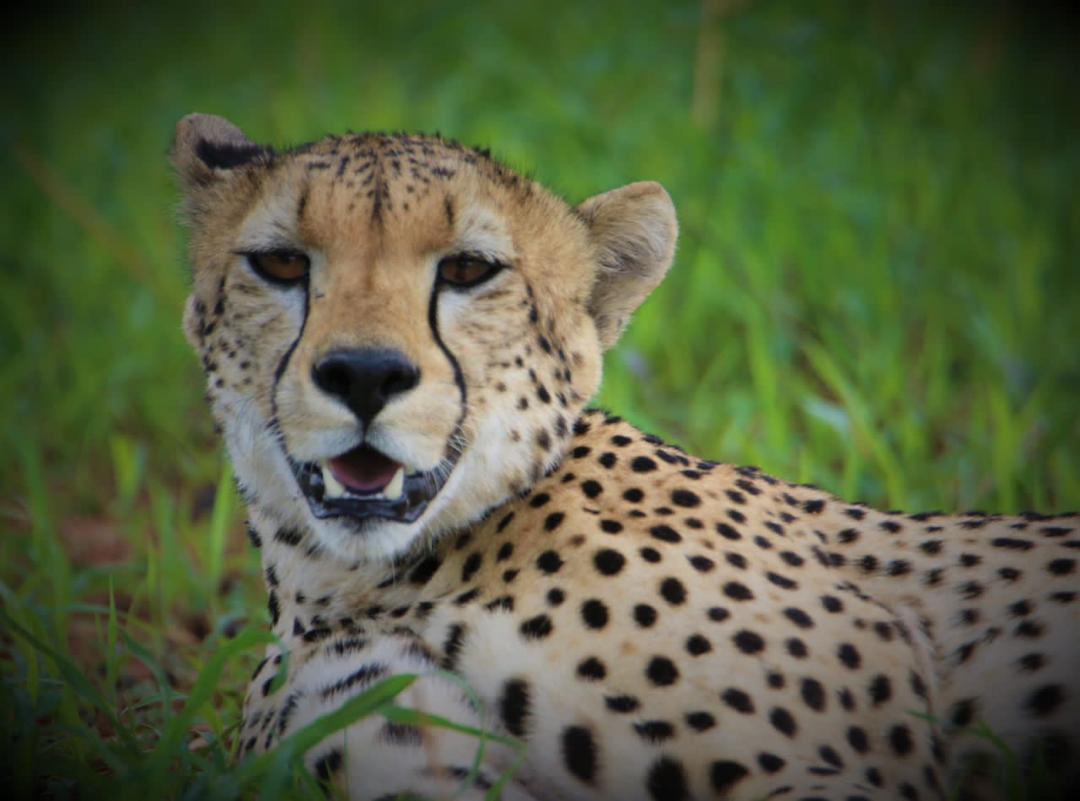


 United States
United States
